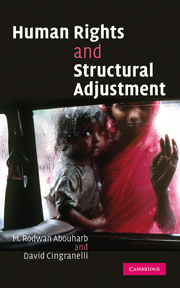Book contents
- Frontmatter
- Contents
- List of figures
- List of tables
- Acknowledgments
- Part I The argument
- 1 Structural adjustment programs undermine human rights
- 2 Respect for human rights promotes economic development
- 3 Theoretical linkages between structural adjustment and repression
- Part II Estimating the human rights effects of structural adjustment
- Part III Findings
- Part IV Conclusion
- Bibliography
- Author index
- Subject index
1 - Structural adjustment programs undermine human rights
Published online by Cambridge University Press: 30 June 2009
- Frontmatter
- Contents
- List of figures
- List of tables
- Acknowledgments
- Part I The argument
- 1 Structural adjustment programs undermine human rights
- 2 Respect for human rights promotes economic development
- 3 Theoretical linkages between structural adjustment and repression
- Part II Estimating the human rights effects of structural adjustment
- Part III Findings
- Part IV Conclusion
- Bibliography
- Author index
- Subject index
Summary
Introduction
In 1981, the Reagan administration in the US, the Thatcher administration in the UK, and their allies compelled the International Monetary Fund (IMF) and World Bank Group (known as the “International Financial Institutions” [IFIs]) to launch an ideological assault against the state and promote a shift in power from the state to the market. From 1981 to the present, the IFIs have financed structural adjustment agreements (SAAs) in developing and transition countries to achieve that goal. Structural adjustment agreements call upon recipient governments to liberalize and privatize economies in the context of strict budget discipline. Adjustment lending facilitates economic integration – the hallmark of globalization – on terms that are advantageous to corporate and finance capital. The policy conditions associated with adjustment loans have accelerated transnational corporate penetration and expansion of markets in developing countries and lowered risks of portfolio investment and foreign direct investment. The role of the state has been reshaped to serve market liberalization, as governments have downsized, decentralized, and privatized (or “contracted out”) their functions. Such measures were intended to jump-start economic growth and free up resources for debt service. However, in most countries, public investment in critical areas (health care, education, infrastructure) foundered, growth rates were disappointing, and debts mounted to unsustainable levels (Pettifor 2001).
This volume explores the relationship between adjustment and respect for human rights. Importantly, as governments in developing countries implemented World Bank and IMF-financed structural adjustment programs (SAPs), respect for human rights diminished.
- Type
- Chapter
- Information
- Human Rights and Structural Adjustment , pp. 3 - 28Publisher: Cambridge University PressPrint publication year: 2007



